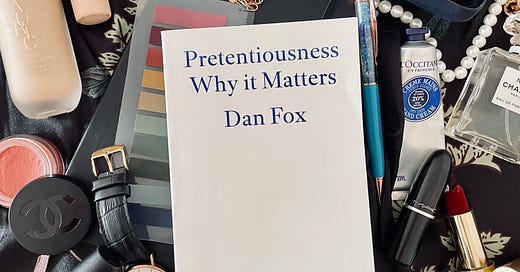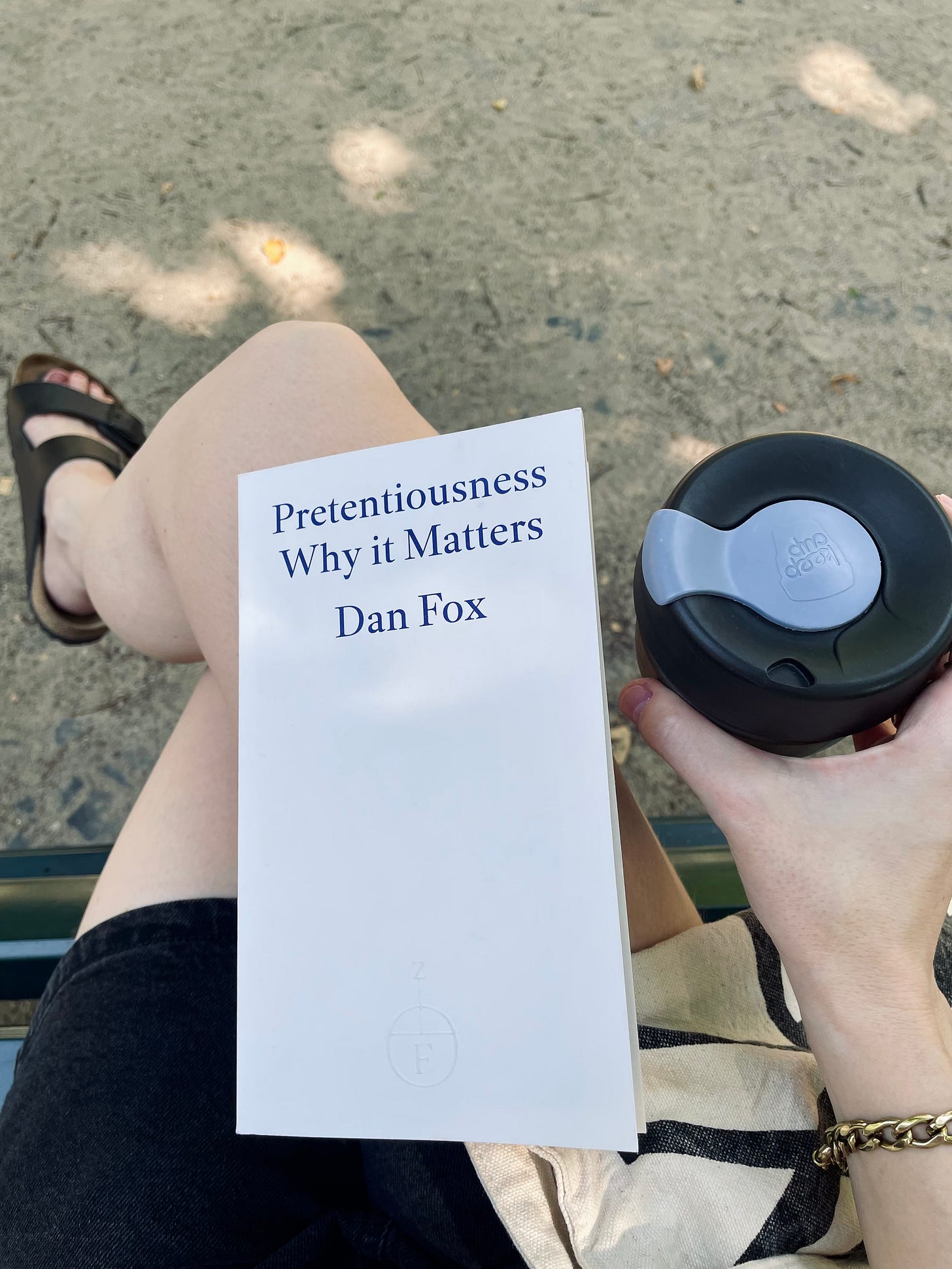physical books, moral failings, and High School Musical
a review of, and personal reaction to, Pretentiousness, Why it Matters
While I was reading this book, and again while I was reading back through my annotations, I took particular pleasure in reading, underlining, and note-taking in public. On public transportation, to be precise. I would take the book and mechanical pencil out of my New Yorker tote bag, cue up a good song on my AirPods, and read with the book held up so that anyone could see the title. Unless I was on an underground metro, I wore my classic RayBans.
Was that pretentious of me? Was I being authentic? Was I being myself?
Would you change your answer if I told you this is pretty much how I read the book at home, alone, where no one can see me? I always underline liberally, in pencil. I play music through my headphones because we live above a very busy playground. And I’m trying to get in the habit of holding books and my phone at eye level to procrastinate on jaw-line droppage and neck wrinkles. (Notice how I didn’t say “prevent”? Very demure. Very realistic). I’ve been known to read on a balcony or two, wearing sunglasses.
If this is how I read at home, is the way I read on public transport pretentious? If I am aware that my actions are read, socially, as pretentious, is it pretentious to continue doing them with pleasure?
That question really drew me into a thought spiral for a while but, according to the author of the book, Dan Fox, it doesn’t matter what my reality is, the reason behind my actions, because pretentiousness is in the eye of the beholder.
“[It’s] always someone else’s crime. It’s never a felony in the first person.”
As an add on to this accusation, as Fox points out (to my utter delight because I’d never considered this aspect of the accusation before), “Performance is generally taken to be a temporary state; the assumption about a pretentious person is that their pretension is bookended by a time before, when they were truly themselves, and a time after, when they will give up their silly act.”
Fox really wrote the first part of this book for me, specifically, when he began with the latin origins of pretentious, Aristotle’s Rhetoric, and the ancient discomfort with people or gods who can change form. Fox continues through history discussing theories of acting and how that relates to, and eventually results in, our current cultural dictum to “be oneself.”
Has anyone ever successfully applied the advice to, “just be yourself”?
One by one, Fox addresses the relationship between pretentiousness snobbery, aspiration, taste, sophistication, and elitism. You’ll have to read the book to find out their similarities and differences, but I will say these bits make the best come-back material if you’re trying to convince someone that pretentiousness is not a moral failing.
Given the austerity of the cover and the idea of analysing pretentiousness, I did not expected the author to get so personal. Several aspects of the book lead me to believe that Fox has been called pretentious more than once in his life. Namely a very long section on pop music from the 60’s through the 90’s where he was defending pop stars and rock bands from the accusation of pretentiousness that I, for one, was not even considering making.
However, I do not begrudge him this indulgence. I love that era of culture and music, and I too have been called cousins of pretentious most of my life: arrogant, stuck up, know-it-all, “who does she think she is”.
Maybe that is why I was drawn to this book, this physically beautiful edition specifically, and why I relished the performance of reading and annotating in front of a my public transportation passenger audience.
And now I better understand why people have made these, rather baffling, accusations. They thought they knew who I was better than I did myself, and were attempting to put me back in alignment with who I really was.
But, if I’m going to be called pretentious no matter if I’m being myself or not, why wouldn’t I be pretentious on purpose? Why wouldn’t I, as Fox quotes Brian Eno, “turn the word ‘pretentious’ into a compliment.”?
So, why does pretentiousness matter; or, why does Pretentiousness, Why Does it Matter matter? On a personal level, because I enjoyed the book and because it is important to romanticise your life, no one else will do it for you. On a societal level, because it is deeply important that people break the status quo:
“Pretension is about over-reaching what you’re capable of, taking the risk that you might fall flat on your face. Without people stretching themselves and — self-consciously or otherwise — risking failure, most of the major works of art, music, literature, cinema, dance, philosophy, science, clothing, design, architecture, engineering, horticulture, and cuisine we cherish would simply not exist. … It is the engine oil of culture; every creative motor needs it in order to keep running and not seize up and corrode with complacency.”
Did you think that was your last quote? Oh sweet summer child.
Do you know what all this reminds me of? A song from the wonderful film High School Musical in which several teenagers finally admit to their cliques that they have *gasp* other interests. And the chorus goes:
No, no, no, noooooooooooooooo
No, no, no,
Stick to the stuff you know
It is better by far
To keep things as they are
Don't mess with the flow, no no
Stick to the status quo
There is one idea presented in this book that I loved but wasn’t quite able to insert into the main bit up there. In discussing acting theory and how it developed through the 1920s Fox says that Bertolt Brecht, “a committed Marxist, held that naturalistic and realist styles of acting did nothing but reproduce on stage the status quo in society, giving the audience an emotionally cathartic experience that left them feeling superficially ‘purged’ but unwilling to demand real change once they left the theatre.”
Speaking of reproducing the status quo in society and political complacency, which Marvel movie sequel are we on now? But who do I think I am? There are three High School Musical movies, and my favourite is the second.
I have not stopped thinking about this part since I read it.





